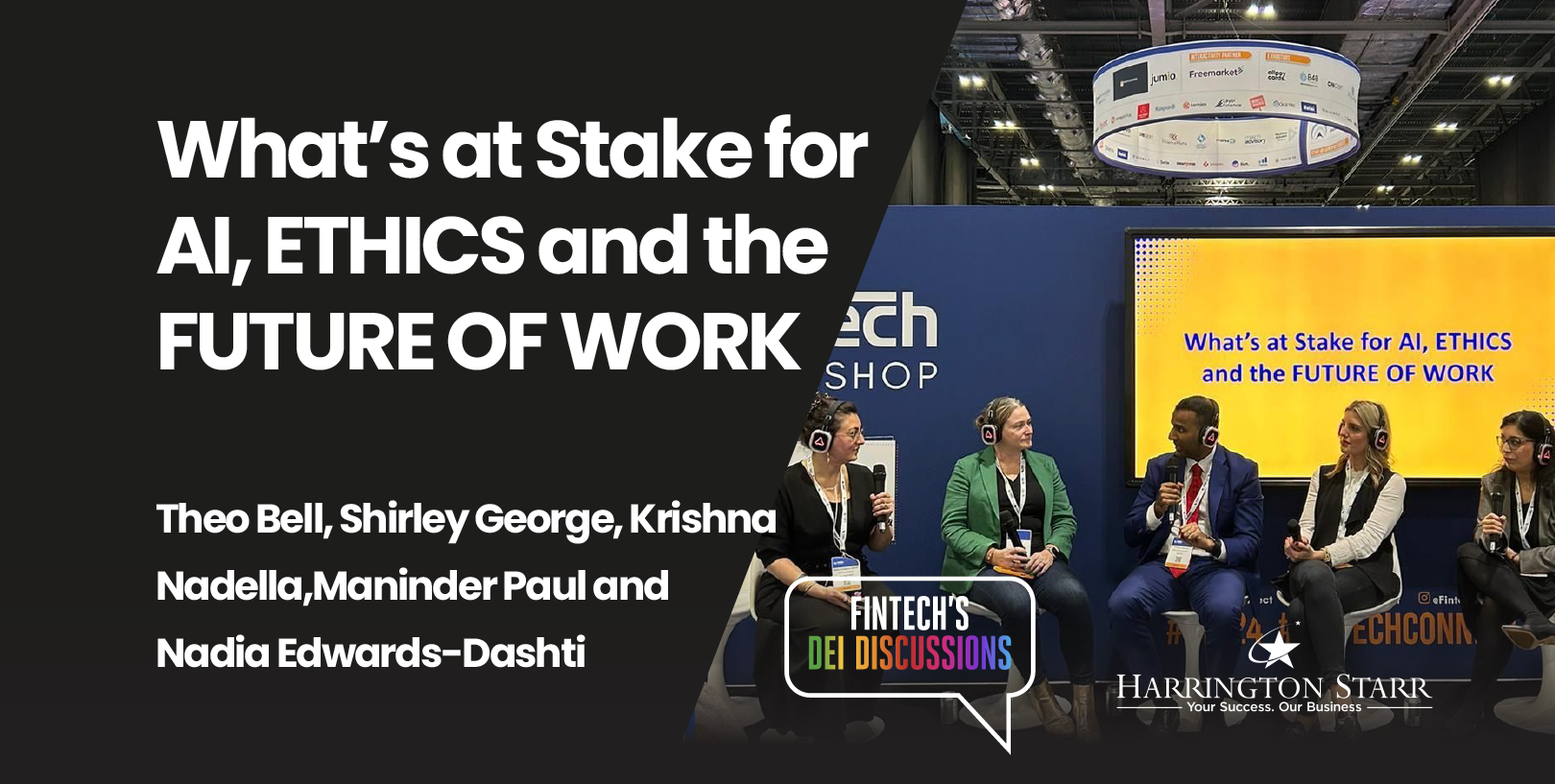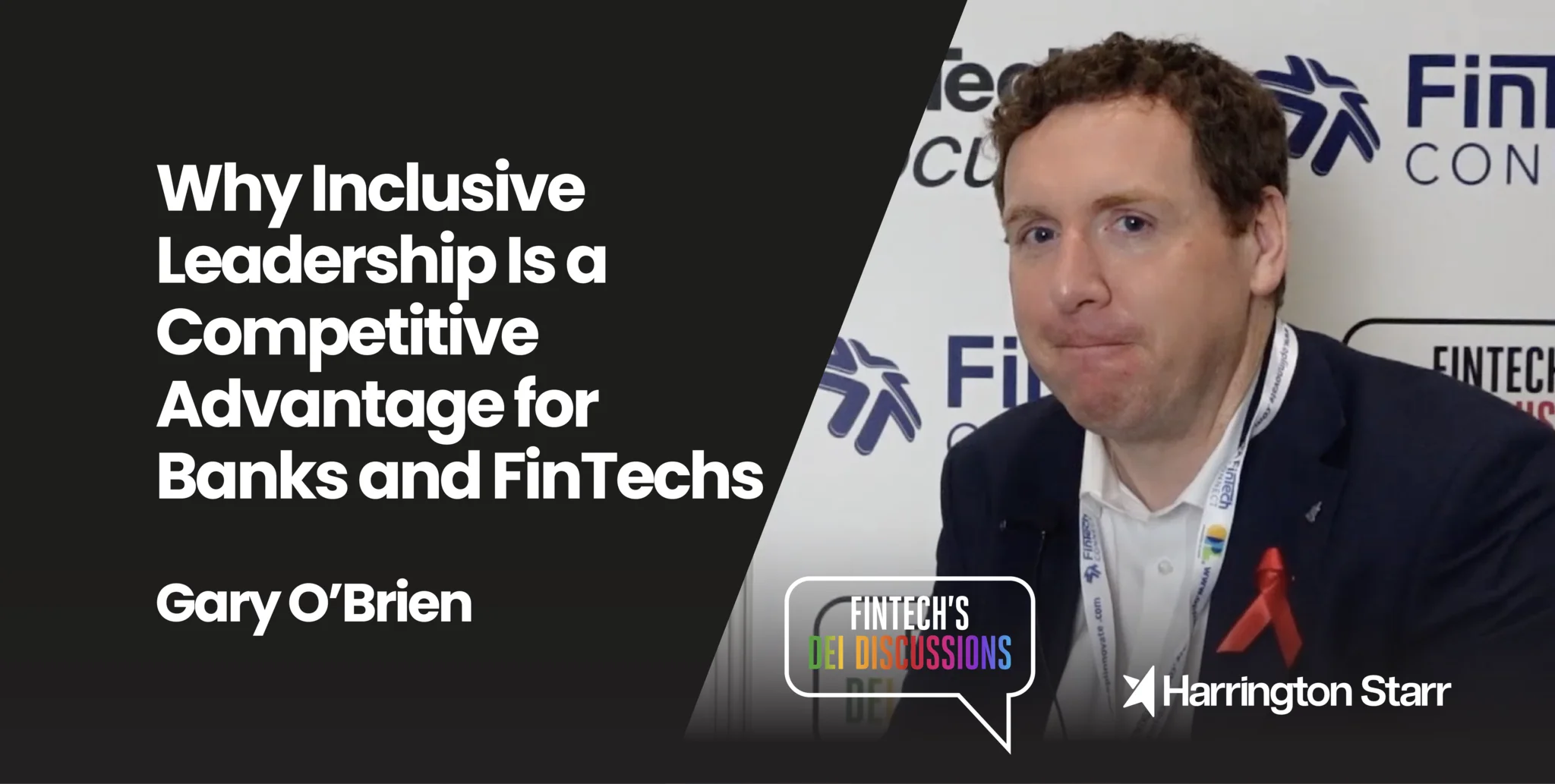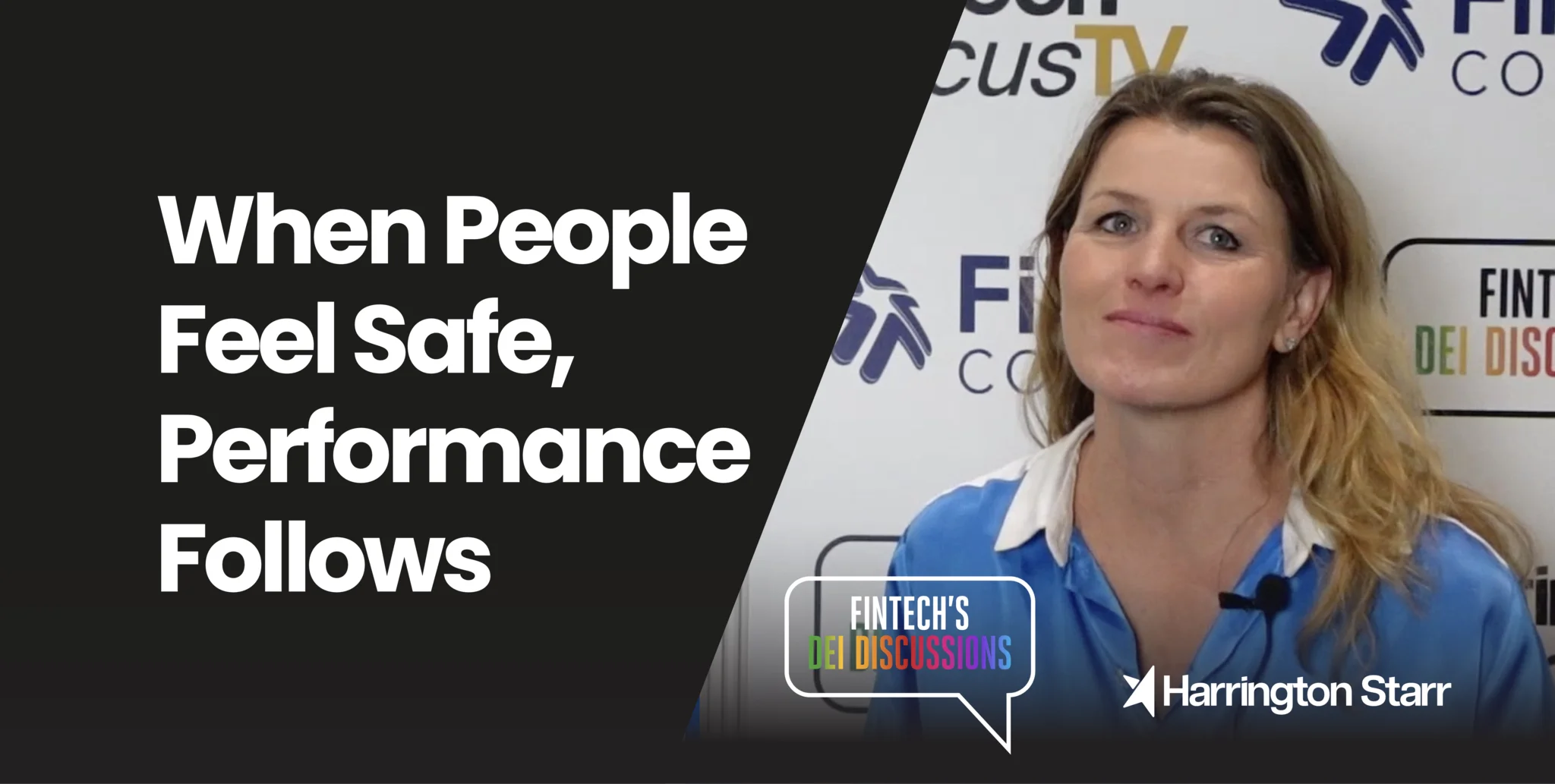Is AI Shaping the Future of Work or Reinventing It Entirely?
In a live panel recorded at FinTech Connect 2024 at London’s ExCeL Centre, FinTech’s DEI Discussions brings together some of the brightest minds to explore the evolving role of artificial intelligence (AI) in the workplace. Hosted by Nadia, this episode features Theo Bell, Head of AI Product at Rimes Technologies; Shirley George, Senior Manager in Financial Services at Accenture; Krishna Nadella, Chief Commercial Officer at SigTech; and Maninder Paul, Growth Marketer. This group dives into the complexities of AI ethics, the future of work, and how businesses and individuals can navigate this rapidly advancing landscape.
The Intersection of AI and Business Needs
The discussion kicks off with a powerful premise: AI is often misunderstood as the starting point for solving problems, but as Theo Bell explains, “AI is definitely not where you start.” Many businesses approach AI expecting immediate solutions without building the foundational data models and robust pipelines required for success. Bell underscores that AI should be the evolution of strong data practices, not a shortcut.
Krishna Nadella brings a startup perspective, highlighting the need for agility and focus in AI adoption. He notes that early-stage companies are “sprinting a marathon,” where survival depends on commercialising products rapidly. His reflections shed light on the tension between speed and responsibility, a theme that resonates across the panel.
Shirley George offers insights into larger enterprises, particularly Accenture’s extensive research on AI’s impact on the workplace. With 89% of organisations still in proof-of-concept (POC) stages, only a small fraction is successfully scaling AI solutions. This gap between experimentation and execution, she argues, represents both a challenge and an opportunity for companies ready to invest in their people and processes.
Reskilling and Upskilling: A Workforce Revolution
As AI reshapes industries, reskilling and upskilling have become urgent priorities. George emphasises that organisations must invest in their workforce to bridge the skills gap. From understanding generative AI to mastering prompt engineering, the need for education is clear. Yet, as George points out, many C-suite executives are reluctant to admit their lack of knowledge about AI. Creating a safe space for leaders to learn is vital for fostering a culture of innovation and inclusivity.
Theo Bell echoes this sentiment, suggesting that AI adoption should be a partnership between companies and individuals. Organisations must act as enablers, providing tools and guidance, while employees take responsibility for their own learning. The conversation delves into the importance of maintaining trust between employees and employers. Nadella warns that without transparency and support, employees may feel abandoned, especially during disruptive market events.
Maninder Paul adds a unique perspective, highlighting the accessibility of AI tools for individuals at all career stages. She shares her experiences of using AI in everyday tasks, from meal planning to holiday organisation, underscoring how AI can democratise access to efficiency and innovation. However, she stresses the importance of setting boundaries and using AI responsibly to avoid burnout.
The Trust Gap in AI Adoption
One of the most striking themes is the trust gap between employees and organisations. Shirley identifies this as a two-way issue: employees often distrust companies to use AI responsibly or invest in their development, while executives may doubt their workforce’s commitment to learning. Krishna’s personal experiences during the 2008 financial crisis underscore the fragility of this trust. He recalls receiving little support for reskilling or repurposing within his organisation, a reality that still resonates in today’s fast-paced AI-driven world.
To address this, the panel explores how AI can be used to rebuild trust. From collecting better data on employee needs to enabling more transparent decision-making, AI has the potential to bridge gaps in understanding. However, as Theo points out, the quality of the data is paramount. “Good data in, good output; bad data in, bad output,” he warns, emphasising that companies must approach AI with clear intent and robust processes.
AI as an Enabler of Creativity and Innovation
The panel also explores how AI can free employees from mundane tasks, enabling them to focus on higher-value activities. Krishna passionately argues that AI accelerates productivity, allowing individuals to be more imaginative and strategic. He draws on his own experiences at SigTech, where large language models (LLMs) have transformed workflows and opened up new possibilities for innovation.
Theo shares an example from a client who developed an AI tool for their CEO to stay informed about industry trends and competitor activity. While the solution might seem simple, it had a profound impact on the CEO’s understanding of AI’s potential and paved the way for further investment. This story highlights the importance of starting small and building buy-in through practical applications.
The Ethics of AI: Guardrails and Guidelines
As the conversation shifts to ethics, the panel delves into the importance of building responsible AI systems. Theo poses a critical question: “Would you be happy for this to happen to you or your loved ones?” This principle underscores the need for human oversight and intentionality in AI decision-making, particularly in sensitive areas like lending or hiring.
Shirley discusses the role of guidelines, guardrails, and education in ensuring ethical AI use. She emphasises the need for organisations to create clear policies and invest in training at all levels, from frontline employees to board members. Paul highlights the importance of involving diverse perspectives in AI development, ensuring that solutions are inclusive and representative.
Krishna offers a candid take on the realities of bias in AI systems. While acknowledging the imperfections of existing models, he argues that businesses must choose between accepting current limitations or delaying progress indefinitely. “History is written by the winners,” he says, pointing out that those who embrace AI’s potential will shape its future.
Balancing Efficiency and Humanity in the AI Workplace
The panel explores the tension between efficiency and humanity in an AI-driven world. George discusses the concept of “human in the loop,” where AI enhances decision-making but ultimate accountability remains with people. This approach ensures that ethical considerations are not overlooked and that employees feel empowered to challenge AI outputs.
Theo takes this a step further, questioning whether the relentless pursuit of efficiency is the right goal. He suggests that AI could pave the way for shorter workweeks or more fulfilling lives, enabling people to contribute to society in new ways. Krishna counters with the realities of startup life, where survival often demands relentless focus and speed. The discussion highlights the diverse ways organisations can approach AI adoption, depending on their goals and values.
The Future of Work: Preparing for Change
Looking ahead, the panel reflects on the profound changes AI will bring to the workplace. Shirley shares data from Accenture’s research, revealing that roles are increasingly being broken down into tasks, with some automated and others augmented by AI. This shift creates both challenges and opportunities, as employees must adapt to new ways of working.
Maninder emphasises the importance of maintaining a level playing field, ensuring that AI tools are accessible to everyone, regardless of their background or experience. She highlights the potential of AI to empower individuals, from senior leaders to interns, to contribute meaningfully to their organisations.
Krishna concludes with a call to action for individuals to take ownership of their professional development. He argues that while organisations play a role in enabling growth, it is ultimately up to individuals to seize opportunities and stay ahead of the curve. His optimism about AI’s potential to unlock human creativity and innovation resonates as a key takeaway from the discussion.
Conclusion: Embracing the AI Revolution
This episode of FinTech’s DEI Discussions offers a nuanced and thought-provoking exploration of AI’s role in the future of work. From ethics and trust to reskilling and innovation, the panel covers a wide range of topics with insight and candour. For businesses navigating the complexities of AI adoption, the message is clear: success depends on building strong foundations, fostering a culture of learning, and embracing the transformative potential of technology.
As a FinTech recruitment business, Harrington Starr is committed to staying at the forefront of industry trends, helping organisations and professionals thrive in a rapidly changing landscape. This episode highlights the importance of collaboration, education, and ethical considerations in shaping a future where AI and humanity work hand in hand.
This panel discussion is deeply relevant to recruitment, especially in the FinTech sector, where Harrington Starr operates as a leader. The insights shared by the panelists highlight the transformative impact of AI on workforce dynamics, from the demand for new skills to the ethical considerations of AI-driven hiring processes. For Harrington Starr, these conversations underscore the importance of staying ahead of technological advancements to guide clients and candidates through an evolving landscape. By understanding the role of AI in shaping job roles and organisational strategies, Harrington Starr continues to deliver value by aligning top talent with forward-thinking businesses.






